What It's Like to Be Medicated
Our readers write in to tell us all about their prescription med situations.
When I asked for submissions from readers about their meds, I didn’t know what to expect. In the time I’ve been doing The Small Bow, I’ve noticed that some are more secretive about the prescriptions they take than they are about their alcoholism or any other addictions. I can understand the hesitation — as much as we’ve come to believe we’re in an age of “eliminating stigma” when it comes to talking about mental health, the stakes are still high to come out publicly. Some may mark you as unhirable, undateable, or dangerously unstable. So that’s why it’s sometimes better to keep it to yourself — or go off the meds entirely. Besides, how hard is it to just be normal? (Hint: It’s hard.)
I’m super-impressed with how open all our contributors were about this topic. We also received so many entries that we will split them into two separate newsletters. Thanks to everyone who wrote in – you’re putting good into the world.
If you are unfamiliar with our Check-In format:
All the Anonymous writers below are credited collectively as “The Small Bow Family Orchestra.”
The ***** separates individual entries, as do pull quotes.
And, of course, TSB looks incredible because Edith Zimmerman drew everything.
And thanks for your continued support of The Small Bow. If you love what we do and believe we have provided some value to you or the people you love, please try out a paid subscription and access our complete archive and the Sunday newsletter. — AJD
(But if you can’t swing it right now — email me and I’ll hook you up with an annual subscription.)
Also: comments are open on this post. Please show your support for everyone who generously wrote in.
It Felt Like a Miracle
“My body and mind have been through so much. I’m terrified to feel what a day without my meds looks like.”
By The Small Bow Family Orchestra
*****
It turns out that I’m a mood-adjusted asshole who spent Christmas snapping at my wife, kids and family, short with every interaction with everyone, and with less than zero patience.
2001: Panic attacks and depression hit an all-time high, accompanied by paranoia. I start having panic attacks at work. Doctor diagnoses me with depression and panic disorder, and prescribes Paxil. It takes two weeks to kick in, but when it does, I sleep more than four hours for the first time in months.
2003: Paxil’s sexual side effects begin to cause other mental health concerns. It’s tough being 25-26, married, and unable to get an erection. Doctor moves me to Lexapro. Boners return. Yeah!
2010: First kid is born. Sleep-deprived, I lose my temper with a nonstop crying newborn. A doctor friend writes me a script for a double dosage of Lexapro for the next 90 days to carry me. Things balance out.
2015: One-off panic attack after my wife miscarries. I double my dose for a few days to get by, lying to the pharmacy about spilling pills to reset my 28-day supply.
November 2024: Doctor is concerned that I’ve been on Lexapro for 21 years. I’m too scared to stop using it, but she suggests moving to something else, in case efficacy has diminished. Start taking Zoloft and break out into a nasty rash. Discontinue and go back to Lexapro. The rash takes six weeks to go away.
December 1, 2024: I run out of Lexapro and start to think about what the doctor said. It’s been 23 years since I’ve been medicated. What if I went off the meds? What would happen? It turns out that I’m a mood-adjusted asshole who spent Christmas snapping at my wife, kids and family, short with every interaction with everyone, and with less than zero patience.
December 27, 2024: I obtain a new supply of Lexapro from my doctor’s office. In the days that follow, my wife notes that I had a monthlong mood swing. I explain going off the pills, blaming the doctor, and she tells me never do that again without giving her a warning.
January 14, 2025: I write AJ an email about my medicated life. We’re supposed to talk meds again next month and we’ll see what happens.
*****
My body and mind have been through so much. I'm terrified to feel what a day without my meds looks like.
I started with Zoloft 50mg a few months after my son was born. Quickly increased to 200mg, 250mg, and finally 300mg. Was diagnosed with breast cancer a year later. Chemo, surgery, radiation, more chemo, more surgery, surgical menopause, and ongoing hormone-suppressing drugs. I thanked god everyday that I was on meds through this shit show. Zoloft managed to take care of my raging OCD (guess what, you can’t control cancer — ahhhhhhh!). I added Effexor mid-treatment, starting at 75mg, 150mg, 225mg, and finally to 300mg. Effexor helped with hot flashes, brain rot, and energy. My oncologist and psychiatrist ask me about my side effects, but I have no good answer. My body and mind have been through so much. I’m terrified to feel what a day without my meds looks like.
*****
It feels like a miracle, like something from a childhood Sunday School lesson. But it’s just science. It’s just chemicals. It’s just medication.
I would not be alive today if it weren’t for my medication. I mean that very seriously. There is nothing — no cocktail of antidepressants + antianxiety meds, no mindfulness techniques, no DBT skills, no amount of social support from my friends and loved ones, and most importantly no amount of sobriety (over 6 years off alcohol!) and regularly attended recovery meetings — that serves the same function.
For decades I lived with debilitating “treatment resistant” depression and suicidal ideation. For decades a voice — a literal actual Voice — would loop in my head and tell me to kill myself. I heard that voice every day, and I do mean *every* day.
My suicidal ideation was not a passive pondering about “what if I vanished tomorrow?” My suicidal ideation was not a thought experiment or philosophical game. It was an *active* daily presence, loud and blaring and unavoidable. It made living life nearly *impossible*.
That I am alive today truly is a matter of luck, not strength.
Last year, I tried a new medication. It worked. The Voice stopped. My problems were no longer “treatment resistant.” Even with all the stress of the world, the Voice hasn’t come back in six months.
The serene calm I feel internally, the gentle “space” I now sense between my thoughts and my impulses and my actions . . . I feel alive for the first time. Truly alive. I feel present in my body and *in control of my mind*. It’s like what I felt when I quit drinking multiplied a million-fold, a billion-fold.
It feels like a miracle, like something from a childhood Sunday School lesson. But it’s just science. It’s just chemicals. It’s just medication. When I told my doctor about the mental changes I felt, he wasn’t surprised.
The medication — or more accurately, the medication regimen — is hormone replacement therapy (HRT). I do HRT because I am trans. Not all trans people need HRT, but then again not all people with bee allergies need EpiPens.
For some trans people such as myself, HRT is necessary. It is not cosmetic. It is not a fun little cherry on top of wearing makeup and new clothes. It is what I need to survive my own brain. It is what I need to survive this year.
Cis people on aggregate do not want to accept this. I am not sure why, but I have my educated guesses. Even people who claim to be allies, who claim to want to see me grow and thrive — they don’t want it to be true. They want to quibble about the word “necessary.” They want to interrogate the exact precise contours of the phrase “life saving.”
I would rather relapse on alcohol than lose access to HRT. I mean that very seriously. Drinking again *may* kill me; losing access to my medication *definitely* will. There is no “me” without my meds, without the way they make my brain habitable.
Cis people on aggregate do not want to accept this.
I encourage them to quibble with my corpse.
*****
I’ve tried a couple times to go off it but there just really wasn’t a benefit.
Have been on Wellbutrin (Bupropion) for 10 years now! We’re old friends. I’m now at 300mg which is at the higher end. A few years back a psychiatrist prescribed me 600mg and I was shaking, it was crazy. My new psychiatrist asked me to get an EKG to check for any cardiac side effects (?) of taking it so long. Didn’t know that was a risk.
I’ve tried a couple times to go off it but there just really wasn’t a benefit. Living in Germany, there is still a massive taboo about psychiatric medication. It’s just not as normalized. When I tell people I’ve taken an antidepressant for 10 years, they are horrified.
In the last year or so I’ve also started taking Quviviq for insomnia. That shit rocks.
*****
I’ve felt a lot of shame about depression: My life is very good and I don’t deserve the indulgence of feeling bad.
I’m on Sertraline (Zoloft), 75mg per day. I started at 50mg the day after my second son was born in 2015 because my then-therapist said I seemed depressed throughout my pregnancy. I increased my dose last spring. My current therapist had me write down the emotions I was struggling with and wanted to address. I haven’t looked at the list since I wrote it down but it includes:
Desire to ‘go away’
Dreading things I should look forward to
Feeling antisocial, unattractive, fog, fatigue
Taking mild criticism very hard
Fixating on old beefs
Feelings of overwhelm
Guilt over letting people down
Like I don’t feel the way about life the way I should.
The dosage increase transition was rough, but I’m glad I did it, especially as my parents started aging a lot harder recently and I have come to accept what I cannot fix. I’ve felt a lot of shame about depression: My life is very good and I don’t deserve the indulgence of feeling bad. But the meds helped with that feeling too.
*****
I haven’t told my wife though, and I haven’t confronted the fact, even with myself, that I am keeping a secret from her. I don’t want it taken away from me, and that’s addict-thinking, I know.
I was on various antidepressants (coinciding with active alcoholism) in my late teens and early twenties but alcohol obviously cancelled out any potential benefits. Six years into sobriety, after a year in my darkest depression to date, I started antidepressants again but from what I tried could only physically tolerate Effexor. It had no effect at any dose as I was titrating up, and I had no hope that it would, until I was eventually taking 225mg a day; within a few weeks the difference was night and day. I was able to open the curtains. I was able to face the world. The crushing weight finally lifted. A few years later I wanted to reduce the dose, as the side effect of fatigue was one that lingered. With my doctor I went down to 150mg, everything felt the same, I went down to 75mg and suicidal thoughts crept in, became daily, then were all I could think about. A moment eventually came where I was convinced I was about to go through with my plan. The undeniable terror of that reality hit hard and I called a friend who brought me to my GP, who referred me to a psychiatrist who saw me that same day.
In the end, going back to 150mg is what made the difference, I think. This all happened not long after I started treatment for chronic migraine, a major stressor that made the suicide plan feel reasonable. I do not wish to mess with the Effexor dose anymore.
These days, thirteen years sober and three years into chronic migraine, I have started taking Kratom. It is illegal where I live and my first time using anything opiate-related (Kratom being a partial opiate agonist). I am at a base-level of pain every day, which fluctuates, and even the advanced treatments I have access to through my headache-specialised neurologist haven’t made a dent. Kratom helps, it brings down the pain and I function much better on it. I can’t say the high isn’t part of the appeal, though it’s similar to the high I got from coffee after being off it for a stretch. I’ve read all the horror stories about the drug and after taking it for six weeks, though not daily, I stopped for a month because I was traveling, and started again last week.
I know I need to be careful, I’m continuing to try other legitimate treatments, but to be able to consistently work and spend time with my wife rather than so often laying in bed unable to tolerate movement or light is a blessing. I’m aware of the pitfalls but this is what’s working for me right now. I haven’t told my wife, though, and I haven’t confronted the fact, even with myself, that I am keeping a secret from her. I don’t want it taken away from me, and that’s addict thinking, I know. It’s probably time to make a therapy appointment about that.
*****
My doctor prescribed Wellbutrin, which made me manic and compulsive. The guy I was dating even emailed to ask if I was insane. I stopped taking it — and stopped seeing him.
I first took an antidepressant in college — Effexor, though I can't remember the dosage — for about a year. It helped with mild depression, but I never mentioned my binge drinking to the campus therapist. At 25, I sought another therapist because my bulimia was out of control. I downplayed my alcoholism but was starting to admit it. She prescribed Wellbutrin, which made me manic and compulsive. The guy I was dating even emailed to ask if I was insane. I stopped taking it — and stopped seeing him.
At 31, I ended up in rehab, where I was briefly on Gabapentin and Effexor. They helped a little, and I began staying sober, but my bulimia was still raging. It wasn’t until I was 33 that I found a therapist who changed everything by recommending Prozac for bulimia. He explained that high doses could help. I went on 80mg, and it completely transformed my life. I’m still mad no one told me that sooner.
It took about a year of medication and cognitive behavioral therapy, but I haven’t binged or purged in 10 years. I went off Prozac when I had kids but now take a lower dose (30mg) and see it as an essential part of my sobriety (with alcohol and bulimia).
*****
I can hardly remember my pre-pill days where I couldn’t leave the house, immobile on my couch while my non-depressive partner tried everything he could think of to help me.
I am pretty sure I started taking antidepressants (Celexa/Citalopram 20mg/day) in early 2016. I assumed I would only be on it for a few months, and tried to reduce the dose in the Fall, only for Trump to be elected in November. Dosage went right back up.
They worked for me. I can hardly remember my pre-pill days where I couldn’t leave the house, immobile on my couch while my non-depressive partner tried everything he could think of to help me.
I suspect I’ve had some undesirable side effects: weight gain, libido decrease, possible inability to feel the high highs.
In 2022 I was relatively depressed (work, kid, pandemic, loss of self) and my therapist at the time pointed out the antidepressants were not working. This was a surprising insight at the time — and possibly the most impactful observation from any therapist I’ve had.
Initially, I wanted to try a new pill, but my new psychiatrist pointed out it was likely my (copious, enthusiastic) alcohol intake that was keeping the Celexa from working. That led me to my insurance program’s evening alcohol addiction recovery program, which released me with 2 months of sobriety. I read Quit Like a Woman and found The Small Bow a month later, and I have now been sober for 3 years.
I attribute my current & unprecedented good mental health to my sobriety. Sobriety + entering my 40s has given me the space and confidence to do things I want to do (read ridiculous amounts of romance fiction) and not do the things I don’t want to do (leave the house, be friends with conservatives).
Over the holidays, I took myself down to 10mg/day (despite the latest Trump election). I may wean myself off completely later this year, if I judge my mental health solid-feeling “enough,” whatever that means. I would like to get off the antidepressants in time for menopause to properly kick my ass on its own merits.
*****
When we got off the phone with a plan to titrate off, I burst into tears.
When I was discharged from a hospital ten years ago, I’d been put on Lithium. A month and another hospital stay adjusted the scrips. I spent the next decade on the same trinity: Lithium Carbonate, Quetiapine, and Lamotrigine.
Mostly I did not really want to know about these drugs. I put my life back together after lighting it on fire on a 100mg dose of Seroquel, sleeping 12 to 14 hours a day. I mostly don’t remember it, but I sobered up, slept, went to the gym, and furiously looked for jobs. It got lowered to 25mg, where I stayed for 9 years. I watched for skin rashes (and got one) on the Lamictal, adjusted when the depression crashed back in.
“I Don’t Believe In God But I Believe in Lithium” came out 9 months after MRIs, EKGs, and doctors diagnosed me. The article stayed with me, especially the indications the element seems to be connected to better mental health in other countries. I thought about getting a “Dangerous Good” hazardous material label tattoo. A nurse friend told me, when I started drinking again, to eat salt afterwards to help my organs. I followed the advice for years.
I stockpiled my meds, afraid of losing insurance with job insecurity, afraid if I went off, I’d arson my life and I could never put anyone through that again. I squirreled away money for medication management and labs. I always awaited the results, terrified my organs were tanking.
Three years ago or so I had a job that kept me on the road and I figured it was the source of my exhaustion and weight gain. After all, I’d done duathlons and 100 mile bike journeys while on meds. Then a doctor let me know my thyroid function was weakening. Last year, both in the wake of a TBI and a very shitty year, I slowly weaned off, felt it in my body.
The past 3 years could only be described as mostly treading water through clinical depression. I found a new doctor who put me on Vraylar, a miracle drug for many. For a month I started regularly smoking. I was solo camping when I started uncontrollably spasming and collapsed. My doctor asked me if I started recklessly spending or fucking. Having while trying to avoid mania for a decade, I immediately stopped.
Things were dark. I dug around, decided I wanted to get off a drug inhibiting my serotonin. I thought about it for months, terrified my doctor would refuse me, chastise me, terrified I’d be addicted, forever. When we got off the phone with a plan to titrate off, I burst into tears. I spent November and December slicing pills into smaller and smaller pieces. It has not been easy, but I’m off it. And I still know if I approach where I was, wanting to die in the most bizarre way, if someone saw the signs, I’ll return to the drugs, without a thought.
*****
We’ll run the second part of our med entries next week. If you’d like to add yours, feel free to email us tsbcheckins@thesmallbow.com
Subject: MY MEDICATED LIFE
Anyone who submits gets three free months of TSB Sundays.
MORE IN THIS SERIES:
What It's Like to Use Ketamine! (For Your Depression.)
"I did have concerns about doing this work and being in recovery, but I dealt with those feelings with my providers and support system, so by the time I had my first session, I felt more comfortable with this decision."
What It's Like to Have Money Shame
"I also have $230K in student loan debt, although I always say that never bothers me; debt just doesn't feel real, I think, not in the same way paying someone to watch and teach my daughter to do things I can't do. So, between using money to get out of debt or pay for childcare, I will always prioritize the present."
What It's Like to Feel Ugly (Part One)
Two weeks ago, I wrote an essay about some of my self-image issues, wondering if it was body dysmorphia. The response was overwhelmingly positive and kind-hearted, but one email completely spun me around, and I haven't stopped thinking about it.
*****
ZOOM MEETING SCHEDULE
Monday: 5:30 p.m. PT/8:30 ET
Wednesday: 10 a.m. PT/1 p.m. ET
Thursday: 10 a.m. PT/1 p.m. ET (Women and non-binary meeting.)
Friday: 10 a.m. PT/1 p.m. ET and 4 p.m. PT/7 p.m. ET
Saturday: Mental Health Focus (Peer support for bipolar/anxiety/depression) 9:30 a.m. PT/12:30 p.m. ET
Sunday: (Mental Health and Sobriety Support Group.) 1:00 p.m PT/4 p.m. ET
*****
If you don’t feel comfortable calling yourself an “alcoholic,” that’s fine. If you have issues with sex, food, drugs, codependency, love, loneliness, and/or depression, come on in. Newcomers are especially welcome.
FORMAT: CROSSTALK, TOPIC MEETING
We’re there for an hour, sometimes more. We’d love to have you.
Meeting ID: 874 2568 6609
PASSWORD TO ZOOM: nickfoles
Need more info?: ajd@thesmallbow.com
This is The Small Bow newsletter. It is mainly written and edited by A.J. Daulerio. And Edith Zimmerman always illustrates it. We send it out every Tuesday and Friday.
You can also get a Sunday issue for $9 monthly or $60 annually. The Sunday issue is a recovery bonanza full of gratitude lists, a study guide to my daily recovery routines, a poem I like, the TSB Spotify playlist, and more exclusive essays. You also get commenting privileges!
Other ways you can help:
BUY A COFFEE MUG FOR YOUR BOOKS
TSB merch is a good thing. [STORE]
Or you can support Edith directly!
Demon With Watering Can Greeting Cards [Edith’s Store]
Or…
or you can give a
that goes toward the production of the podcast.
Everything helps.
A POEM ON THE WAY OUT:
Burlap Sack
by Jane Hirshfield
A person is full of sorrow the way a burlap sack is full of stonework sand.
We say, “Hand me the sack,”
but we get the weight.
Heavier if it got left out in the rain.
To think that the sand or stones is the self is an error.
To think that grief is the self is an error.
Self carries the grief as a facsimile carries the side bags,
being careful between the trees to leave extra room.
The self is not the load of ropes and nails and axes.
The self is not the miner nor builder nor diver.
What would it be to take the bride
and leave behind the heavy dowry?
To let the thin-eared mule browse the tall grasses,
it’s long ears waggling like the tails of two happy dogs?
— via “Best American Poetry 2005”
Read more about Jane Hirshfield
*****


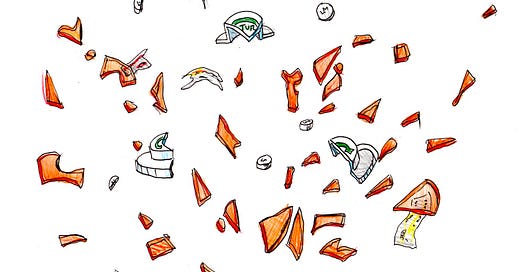

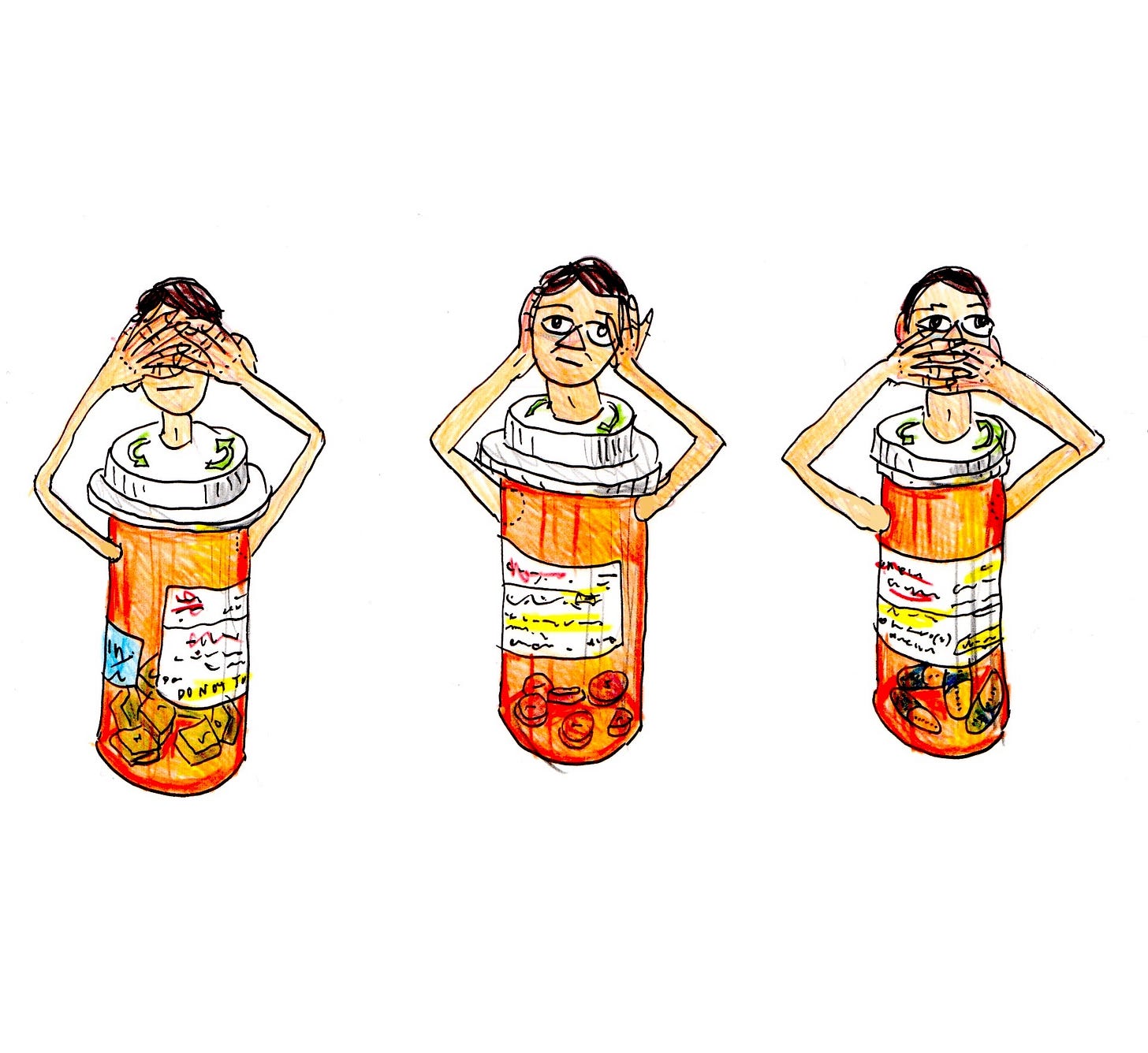
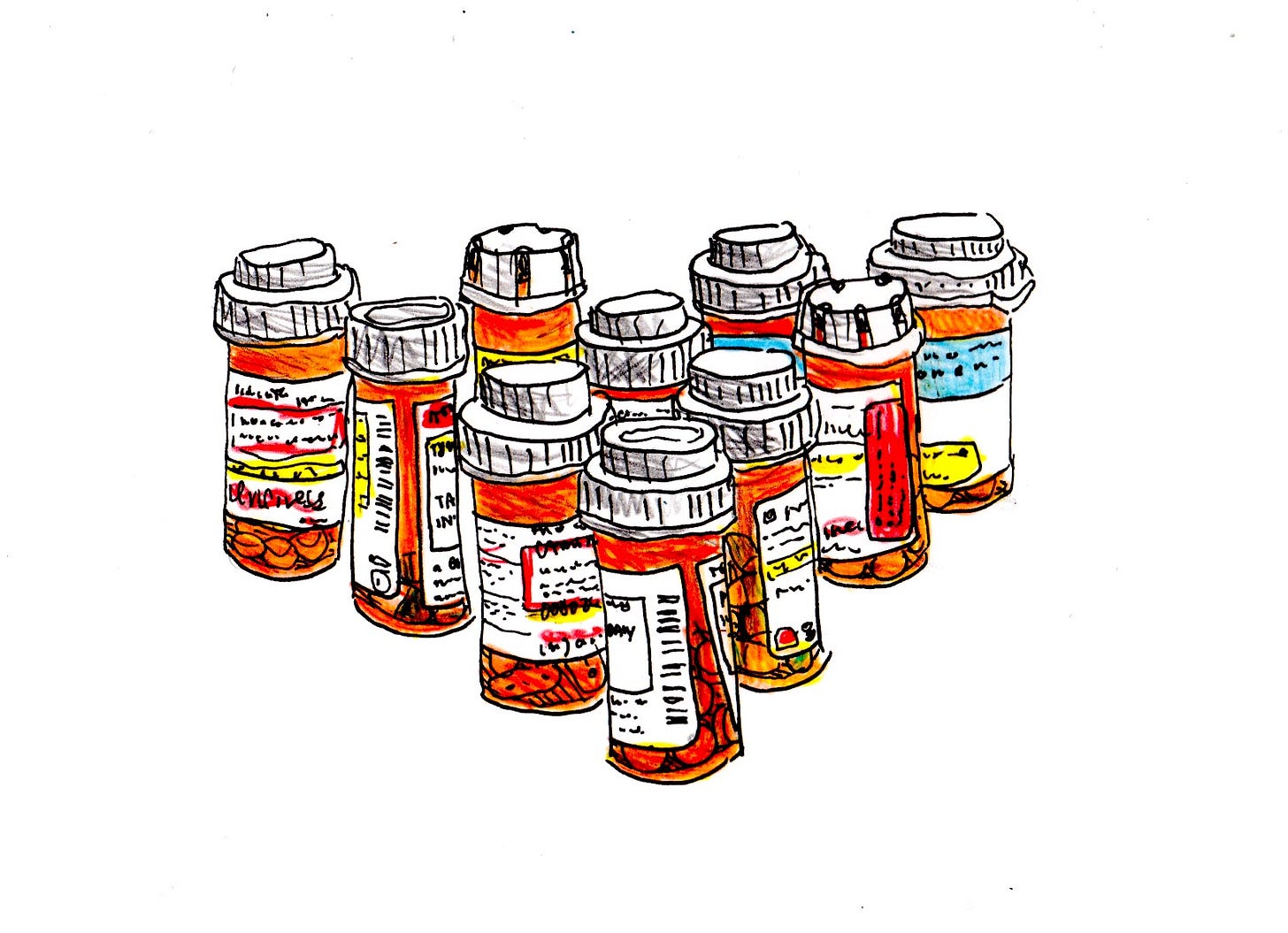
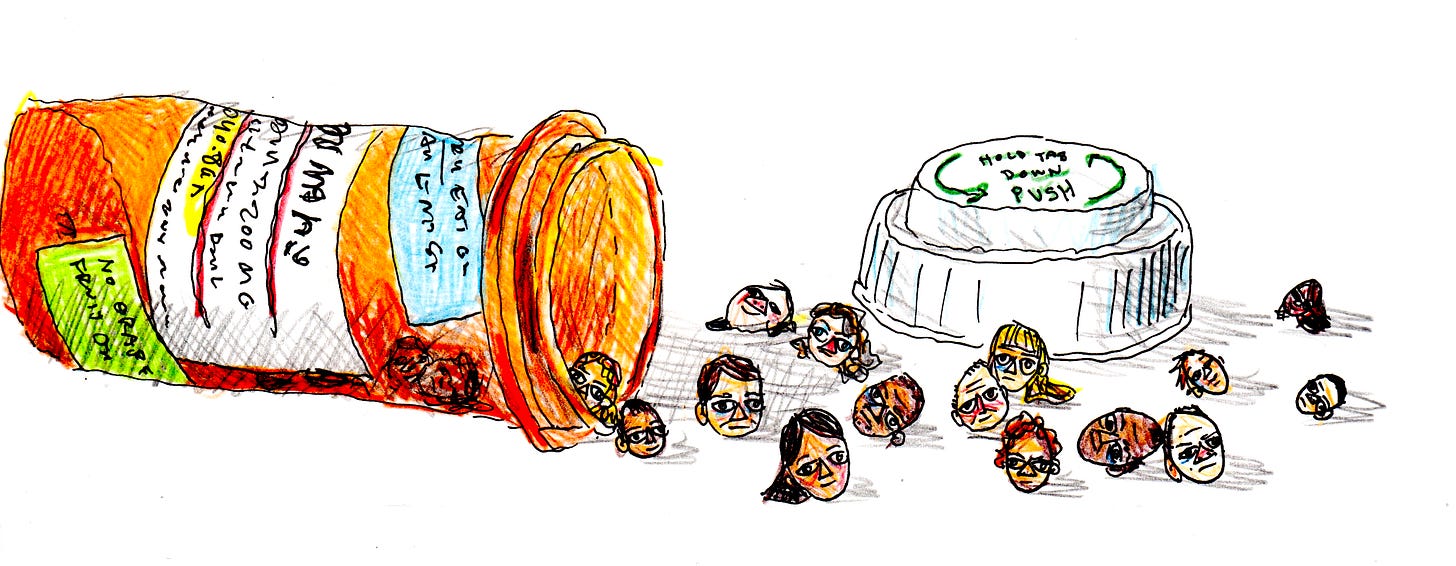





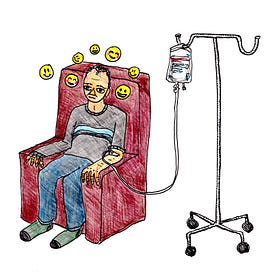
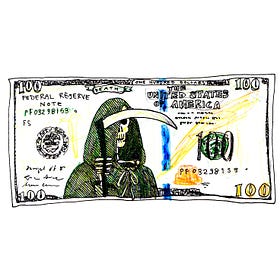
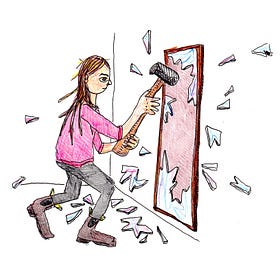
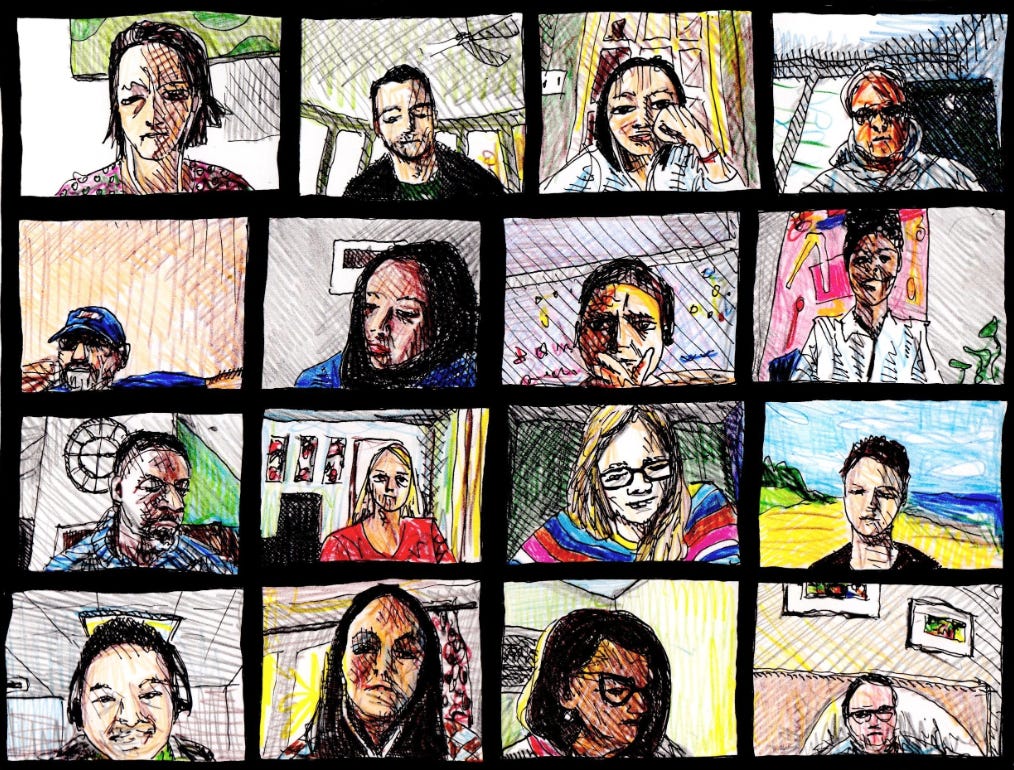
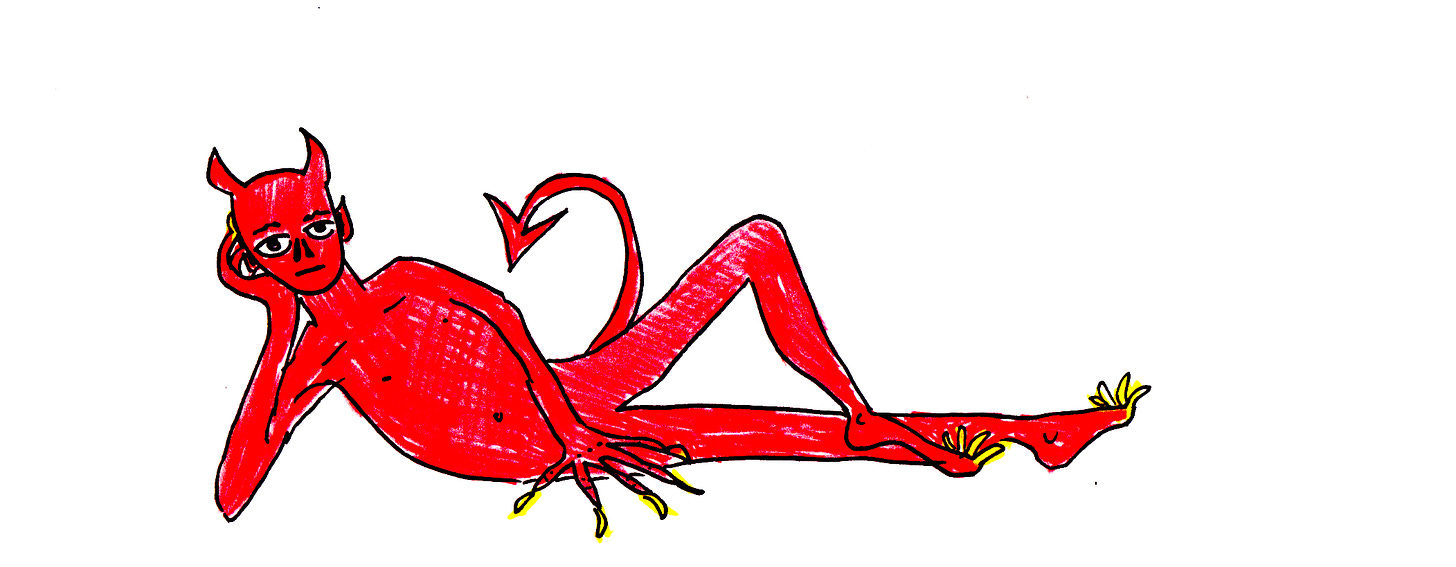
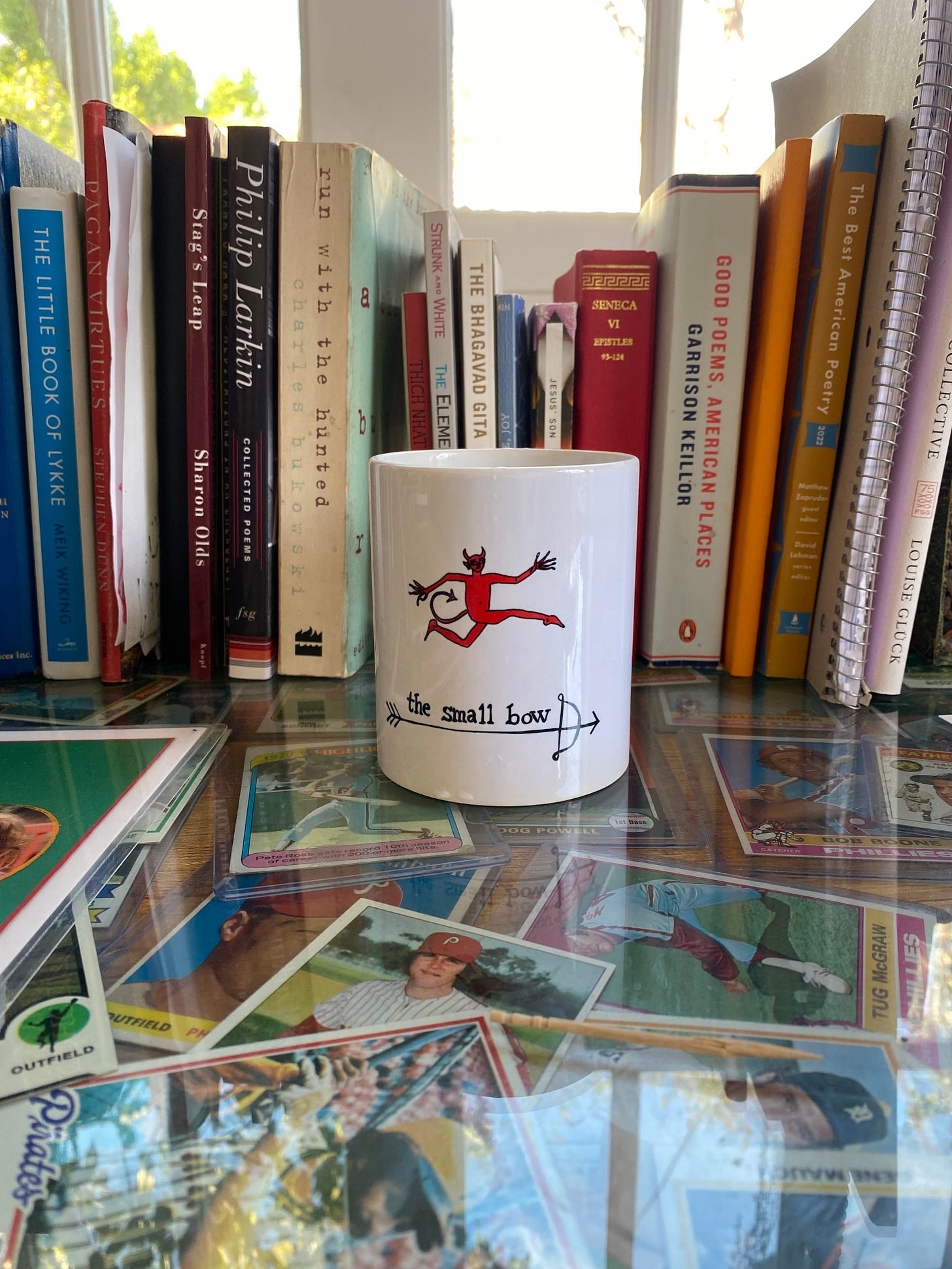
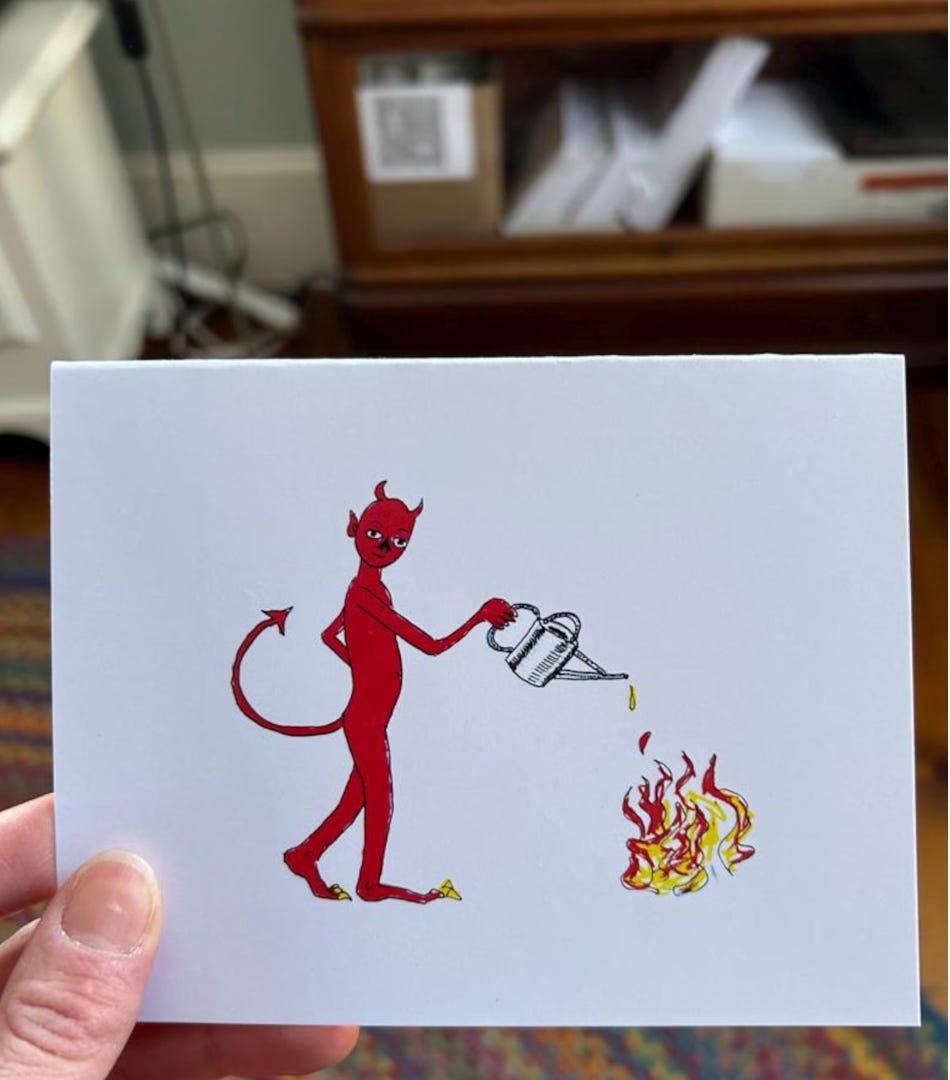

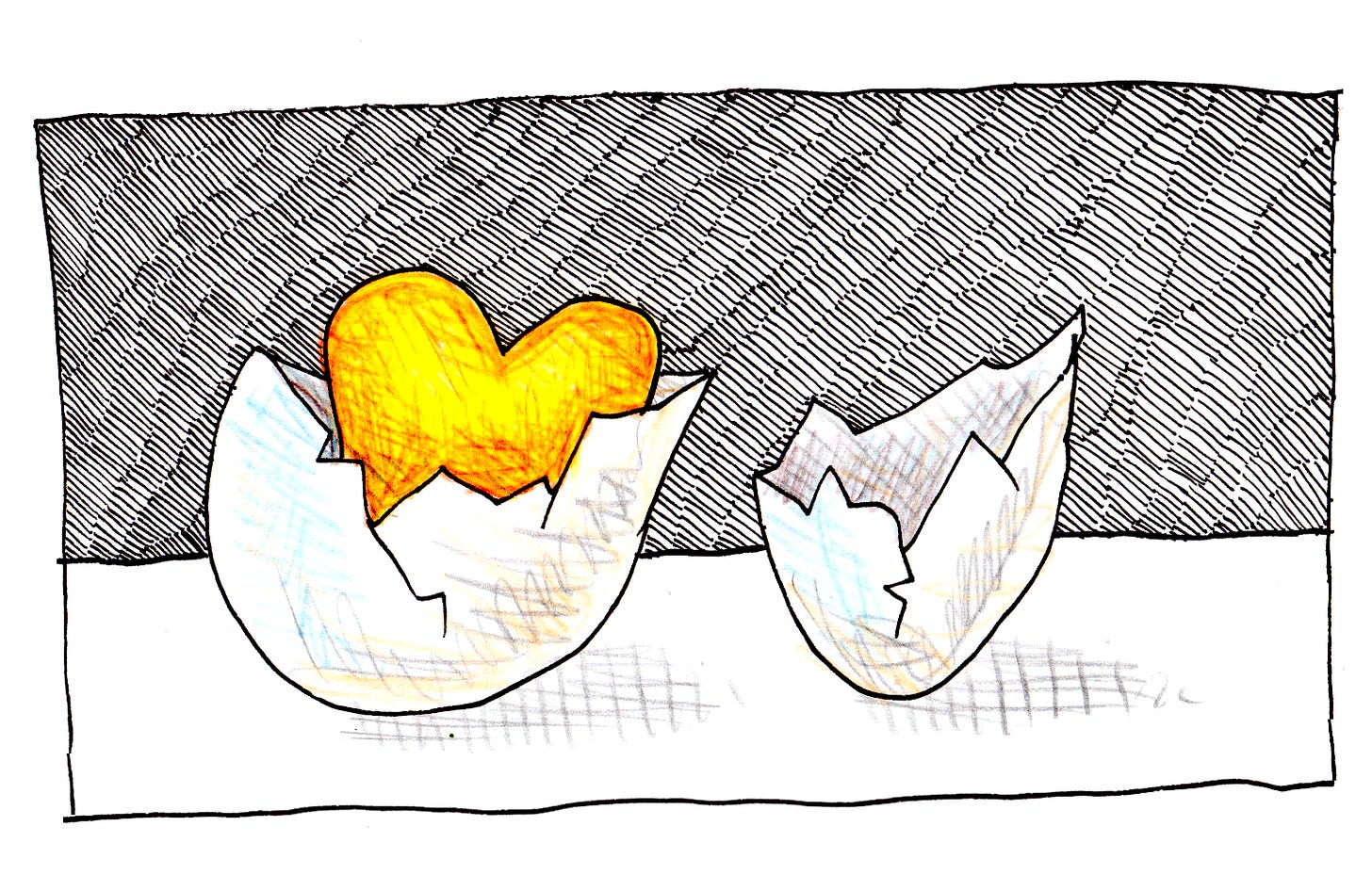
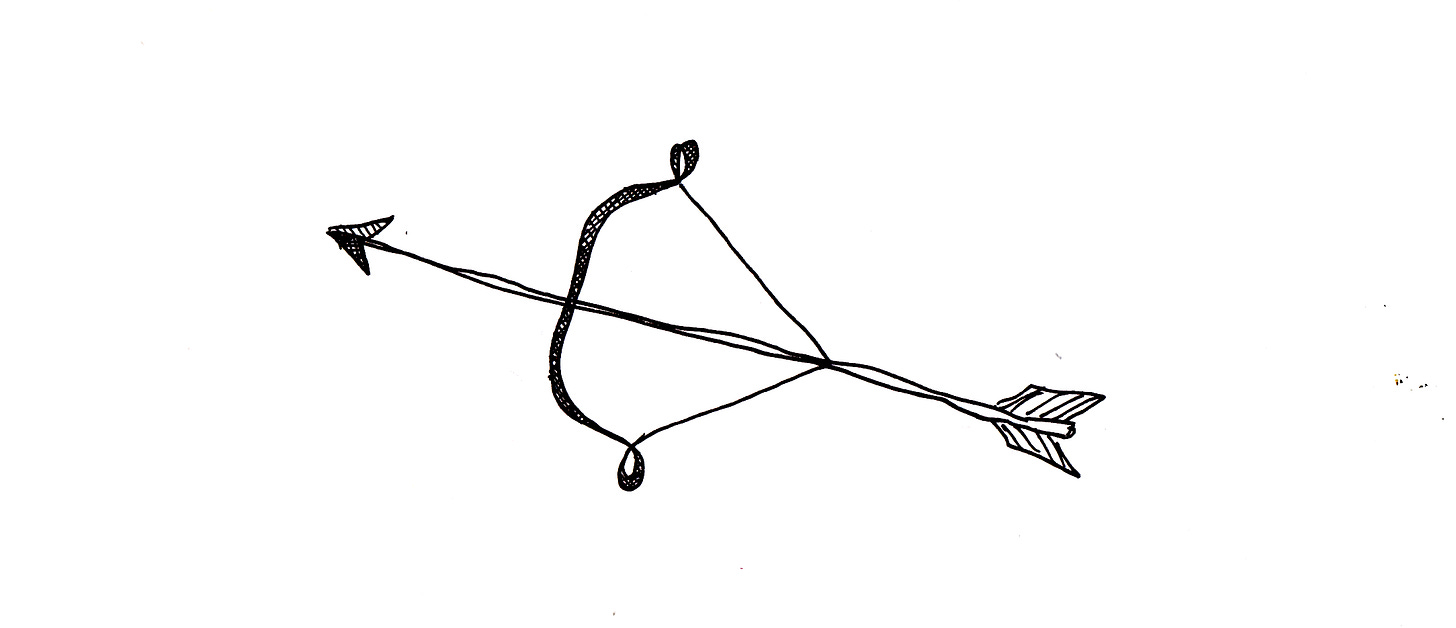
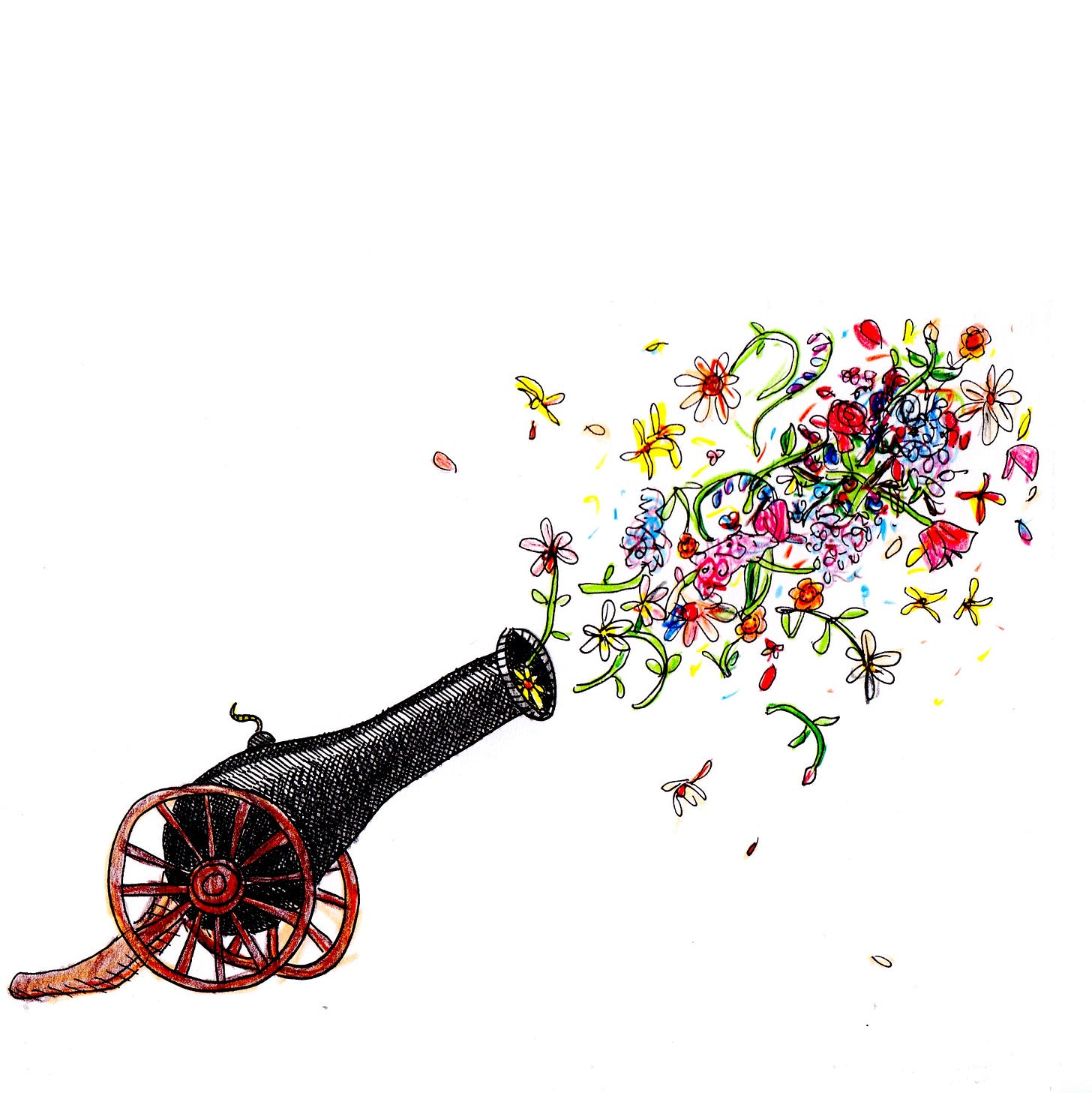
I really appreciate everyone sharing their stories. I have been on and off antidepressants throughout adulthood (currently on), and I'm weirdly susceptible to arguments against them and always feel guilty about being on them. (Even though I 1000% believe in them for anyone else and would never EVER negatively judge someone for being on them.) My depression has always been mildish, so I can't argue that medication is saving my life. But it does seem to make me hate things a little less--and if a pill helps me to appreciate and make the most of my one and only life, why not take it? So thank you to everyone for these antidepressant shares, which make me feel less guilty for being on them :) Good luck to everyone!
I’m a cis person whose life was also saved by HRT during perimenopause, when my suicidal ideation got really bad. Not here to quibble at all… I will fight for anyone and everyone’s rights to their gender affirming medication.